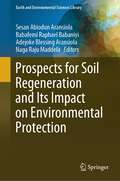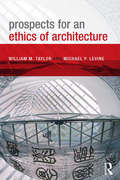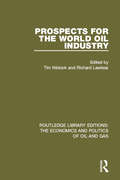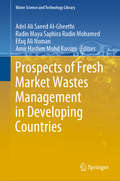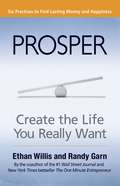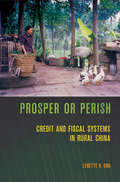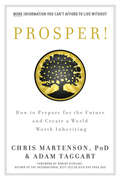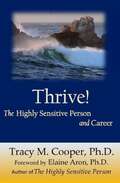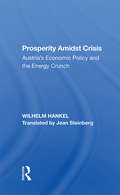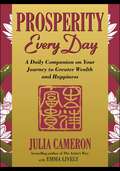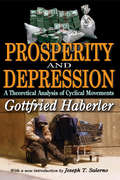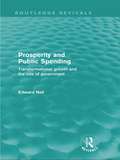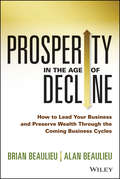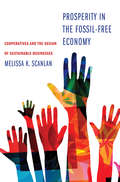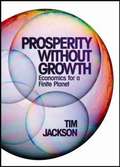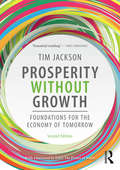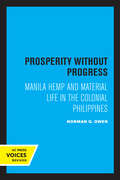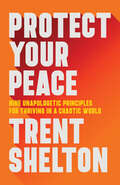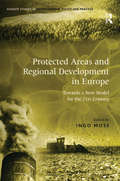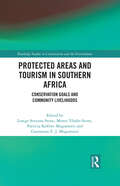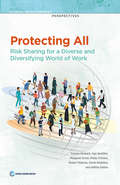- Table View
- List View
Prospects for Soil Regeneration and Its Impact on Environmental Protection (Earth and Environmental Sciences Library)
by Naga Raju Maddela Sesan Abiodun Aransiola Babafemi Raphael Babaniyi Adejoke Blessing AransiolaSoil is a complex system of inorganic and organic materials, living organisms, water, and air. It is home to more than one trillion species of microorganisms. Soil also plays an important role in the global carbon cycle. Because plants absorb carbon from the atmosphere, convert it to plant tissue, and return it to the soil as plant residue, soils globally act as the world’s largest sink of active carbon. Soil has role to play in food production and safety. Soil contamination undermined by modern agricultural practices that deplete soil carbon stocks. Anthropogenic greenhouse gas emissions have been raising recorded temperatures since the Industrial Revolution. Greenhouse gas emissions from agriculture, forestry, and fisheries have almost doubled in the last 50 years and will increase by 30% by 2050 given the current trend. The primacy of arresting climate change is nowhere more evident than the adoption of 195 countries of the first legally binding global climate deal at the Paris Climate Conference in 2015. With atmospheric carbon dioxide (CO2) reaching 400 parts per million in 2016, soils can be an ally in bringing the CO2 level down to a sustainable level if protected for regeneration. Soil protection and regeneration is a technique that involves the conservative rehabilitation of soil ecosystem and farmland. This technique focuses on top soil regeneration, improving the water cycle, supporting biosequestration, enhancing ecosystem services, increasing biodiversity, strengthening the vitality and health of farm soil, and increasing resilience to climate change and landscape. Environmental protection not only improves soil health, productivity, and resilience to weather extremes, raising farm yields and income while strengthening regional food security in the face of a changing climate, but can also form part of a region’s broader climate strategy. This book is timely as more studies and reviews need to be reported about regenerating global polluted soil and the impacts on the environment, the benefit of both biotic and abiotic structure, thereby creating more awareness of environmental protection and sustainability. Thus, this book presents a vista to research on regeneration of lost resources in the soil and its impacts on the environment.
Prospects for an Ethics of Architecture
by Michael P. Levine William M. TaylorBringing together the reflections of an architectural theorist and a philosopher, this book encourages philosophers and architects, scholars and designers alike, to reconsider what they do as well as what they can do in the face of challenging times. It does so by exploring the notion that architecture and design can (and possibly should), in their own right, make for a distinctive form of ethical investigation. The book is less concerned with absolutist understandings of the two components of ethics, a theory of ‘the good’ and a theory of ‘the right’, than with remaining open to multiple relations between ideas about the built environment, design practices and the plurality of kinds of human subjects (inhabitants, individuals and communities) accommodated by buildings and urban spaces. The built environment contributes to the inculcation of all sorts of values (good and bad). Thus, this book aims to change the way people commonly think about ethics, not only in relation to the built environment, but to themselves, their ways of thinking and modes of behaviour.
Prospects for the World Oil Industry (Routledge Library Editions: The Economics and Politics of Oil and Gas #10)
by TIM NIBLOCK AND RICHARD LAWLESSWritten in 1985, at a time when the world oil industry was facing a difficult period of over-supply and falling prices, this book examines some of the most important strategic issues facing both the producers and consumers of oil and gas. A theme underlying al the papers is the need for strengthening the co-operation between producing and consuming nations, especially between the Arab Gulf States and the members of the EU. The security of supply is also examined in the light of regional instability and peace in the Middle East.
Prospects of Fresh Market Wastes Management in Developing Countries (Water Science and Technology Library #92)
by Radin Maya Saphira Radin Mohamed Adel Ali Saeed Al-Gheethi Amir Hashim Mohd Kassim Efaq Ali NomanThis book focuses on the prospects of fresh market waste management in developing countries. It characterizes fresh market wastewater and solid wastes, and highlights the human health impact of corresponding waste management practices. With regard to treatment technologies, the book discusses the anaerobic digestion of fresh solid wastes; the application of natural coagulants for wastewater treatment; the remediation of xenobiotics in wastewater using nanotechnology; and biofilter aquaponic systems for nutrient removal. All of these technologies are recent innovations, offer several concrete advantages, and can be applied in developing countries as non-central treatment systems. In addition, the book covers electricity production from fresh solid wastes using microbial fuel cells, demonstrating the potential held by recycling fresh market wastewater and solid wastes.
Prospects of Renewable Bioprocessing in Future Energy Systems (Biofuel and Biorefinery Technologies #10)
by Ajar Nath Yadav Arti Gupta Ali Asghar RastegariThis book discusses various renewable energy resources and technologies. Topics covered include recent advances in photobioreactor design; microalgal biomass harvesting, drying, and processing; and technological advances and optimised production systems as prerequisites for achieving a positive energy balance. It highlights alternative resources that can be used to replace fossil fuels, such as algal biofuels, biodiesel, bioethanol, and biohydrogen. Further, it reviews microbial technologies, discusses an immobilization method, and highlights the efficiency of enzymes as a key factor in biofuel production. In closing, the book outlines future research directions to increase oil yields in microalgae, which could create new opportunities for lipid-based biofuels, and provides an outlook on the future of global biofuel production. Given its scope, the book will appeal to all researchers and engineers working in the renewable energy sector.
Prospects of the Industrial Areas of Great Britain (Routledge Library Editions: Industrial Economics #27)
by M. P. FogartyThis book, first published in 1945, is based primarily on some fifty regional reports submitted to the Government between 1941 and 1943. The original reports, condensed and brought together in this volume, were for the most part prepared by members of university departments of economics or geography.
Prosper
by Ethan Willis Randy GarnWhat is true prosperity? Is it simply having enough money? Certainly financial security is necessary for peace of mind. But for many people the pursuit of money stresses and exhausts them so much, it makes peace of mind impossible. And they're always chasing after more--they never feel like they have enough. True prosperity is when there is no conflict between money and happiness--when you don't have to drag yourself out of bed every morning because the way you make a living is true to who you are. And when your way of life is sustainable, you don't fall victim to the boom/crash syndrome that afflicts so many people because you know exactly what you need to be happy and have a plan to achieve it. For the past twelve years Ethan Willis and Randy Garn have helped tens of thousands of people find their own personal path to prosperity. After nearly 11 million hours of personal coaching observation in eighty countries, they've developed six Prosperity Practices that will enable you to create a life that is rich, rewarding, and renewing. You begin by focusing on what you have, not on what you do not--you'll be sur- prised what you find once you shift your way of thinking. A key part of this process is determining what Willis and Garn call your "Polaris Point": a precise description of the life you want and what you need to sustain it. This becomes your own private North Star, guiding all your actions and keeping you from chasing after things you don't really want or need. Then you'll discover how to leverage your passions, experi- ence, and expertise to generate the income you require to reach your Polaris Point. Although you'll find much to reflect on here, Prosper is an action guide--at the end of each chapter, Willis and Garn provide concrete steps you can take to make each of the Prosperity Practices a reality. Soon your life will be aligned with the core of your being, you will have a deep understanding of what you need to be happy, and you'll know how to hold to that vision--and you will truly prosper.
Prosper or Perish: Credit and Fiscal Systems in Rural China
by Lynette H. OngThe official banking institutions for rural China are Rural Credit Cooperatives (RCCs). Although these co-ops are mandated to support agricultural development among farm households, since 1980 half of RCC loans have gone to small and medium-sized industrial enterprises located in, and managed by, townships and villages. These township and village enterprises have experienced highly uneven levels of success, and by the end of the 1990s, half of all RCC loans were in or close to default, forcing China's central bank to bail out RCCs. In Prosper or Perish, Lynette H. Ong examines the bias in RCC lending patterns, focusing on why the mobilization of rural savings has contributed to successful industrial development in some locales but not in others.Interweaving insightful and theoretically informed discussions of rural credit, development, governance, and bank bailouts, Ong identifies various sources for China's uneven development. In the highly decentralized fiscal environment of the People's Republic, successful industrialization has significant implications for rural governance. Local governments depend on revenue from industrial output to provide public goods and services; unsuccessful enterprises starve local governments of revenue and result in radical cutbacks in services. High peasant burdens, land takings without adequate compensation by local governments, and other poor governance practices tend to be associated with unsuccessful industrialization. In light of the recent liberalization of the rural credit sector in China, Prosper or Perish makes a significant contribution to debates within political science, economic development, and international banking.
Prosper!
by Chris Martenson Adam TaggartThe Next 20 Years Will Be Completely Different From The PastCurrent global trends are bleak: weak economic growth, too much debt, declining incomes for the lower 99%, a dangerous addiction to fossil fuels, and ecological destruction just to name a few. Many of us understandably feel resigned to an eroding standard of living in the years to come. At best. But what if we told you that there are specific, attainable steps you can take today that can limit your vulnerability to these trends and help you be: - Richer- Live with greater purpose- Healthier- More valued by others- Happier- Safer from harm That s exactly what Prosper offers: a blueprint for taking control of and improving your destiny. It outlines practical, actionable investments of your time & resources that will ensure you enjoy greater prosperity in your life, whatever the future may bring. In Prosper , Martenson and Taggart will explain: - The trends mostly likely to shape your life over the next 20 years- Why developing resilience offers your best chance for thriving, even though society may suffer from the changes these trends may bring- How to build true wealth- What specific actions to take now to secure a prosperous future, no matter what the future holds- How everybody can benefit from this guidance, regardless of age, income or ability How we can best serve the next generation by the actions we take today Prosper is the highly anticipated follow-up to Martenson s acclaimed book The Crash Course (Wiley, 2011)"
Prosperare: la persona molto sensibile e la sua carriera
by Tracy CooperIn questo libro innovativo la ricercatrice e collega HSP (sigla inglese che sta per "persona molto sensibile"), la dottoressa Tracy Cooper, presenta nuovi importanti risultati della ricerca che possono permetterti di capire meglio come gli HSP vivono il posto di lavoro moderno, scoprono nuove opportunità emergenti e si connettono con le narrazioni degli HSP da un'ampia varietà di punti di vista del mondo reale. Questo libro è dedicato alla persona altamente sensibile che desidera andare oltre la sopravvivenza per prosperare! Basato sulla ricerca della dottoressa Elaine Aron , questo libro è un must da leggere per tutti gli HSP!
Prosperity Amidst Crisis: Austria's Economic Policy And The Energy Crunch
by Wilhelm Hankel Jean SteinbergThis book deals with the exciting question of whether the world economic crisis can in fact be stopped only by a fight among all against all by forcing others to make painful adjustments in their demand, price, and employment levels.
Prosperity Every Day
by Julia Cameron Emma Lively"People think of prosperity as a fiscal bottom line. 'When I have X amount of money, I will feel better.' The truth is that prosperity is a spiritual bottom line, and the formula should actually be: 'When I have X amount of faith, I will feel better.'" --Julia Cameron In this collection of 365 reflections on prosperity, readers will discover how they can become more and more prosperous with each new day of the year. According to Cameron, true prosperity has nothing to do with money. Rather prosperity is about appreciating the life you have, even as you take practical steps to improve your financial situation. Prosperity Every Day offers daily support on your journey toward greater prosperity--both in your wallet and in your life. Read daily, these meditations will put you on a spiritual path that improves your solvency.
Prosperity and Depression: A Theoretical Analysis of Cyclical Movements
by Gottfried HaberlerFirst issued in 1937 and then revised in 1957, Prosperity and Depression focuses on the task of analyzing existing theories of the business cycle and deriving a synthetic account of the nature and possible causes of economic fluctuations. The application, as far as possible, of quantitative tests to the various causal hypotheses - influences the manner in which the problem of economic cycles is approached in Haberler's book.The first part on ""The Systematic Analysis of the Theories of the Business Cycle"" gathers various hypotheses of explanation, to test their logical consistency and their compatibility with one another and with accepted economic principles. It gives a well rounded picture of the possible explanations of economic fluctuations. The second part, ""Synthetic Exposition Relating to the Nature and Causes of Business Cycles"" argues that there are many points where no definitive solution can be proposed, but have a number of possibilities. The choice between these can then be made only on the basis of empirical investigations.Haberler argues that theoretical reasoning supported only by broad facts as one happens to know without special statistical or historical investigations can create intelligent questions, but it cannot definitely answer them. By analyzing various theories and explanations of the business cycle, this book clarifies a number of issues presupposed. The difference between the theories analyzed is not as complicated as is sometimes believed. In fact it is shown how theories which seem prima facie to contradict one another can be reconciled. David Felix's new introduction underlines the continuing importance of this classic.
Prosperity and Public Spending: Transformational growth and the role of government (Routledge Revivals)
by Edward NellIn a dramatic and well-argued challenge to the prevailing wisdom, Prosperity and Public Spending, first published in 1988, contends that the failure of Keynesian economics has been due to its timidity. Far from contracting, the government must expand its powers and activities, in order to achieve and maintain economic prosperity. The need for such expansion arises from the fact that the system has developed from a craft-based economy to a mass-production network with sophisticated international finance. This "transformational growth" brings about irreversible and sometimes devastating changes, requiring government action. Professor Nell argues that a lack of government action in the decade prior to the book’s initial publication was responsible for the stagnation of the economy and he asserts that this could only be overcome by a determined policy intervention and the political will to achieve dominance over private capital.
Prosperity in The Age of Decline: How to Lead Your Business and Preserve Wealth Through the Coming Business Cycles
by Alan Beaulieu Brian BeaulieuA guide for protecting your wealth in an age of turbulent business cycles In Prosperity in the Age of Decline, Brian and Alan Beaulieu--the CEO and President of the Institute for Trend Research® (ITR)--offer an informed, meticulously-researched look at the future and the coming Great Depression. Drawing on ITR's 94.7% forecast accuracy rate, the book outlines specific, actionable strategies for capitalizing on cyclical opportunities and dodging economic danger. In this important resource, the authors reveal what it will take for individual investors and business leaders to prosper as the economy heats up prior to the predicted downturn, preserve wealth in the upcoming Great Depression, and profit on the way out of the depression. The imbalances and maladjustments have a while to play out and the authors pinpoint the investment opportunities to be had in the countdown period. The Beaulieu's examine the major economic trends at play, such as low interest rates, burgeoning government debt, and an aging population. They discuss which trends will last and what investors should do with this knowledge in order to thrive. The book also reviews the group of leading economic indicators that most consistently achieve reliable results for predicting where the economy is headed. Designed as a useful tool for investors, the book includes a working list of key trends, describes the upside potential of each trend, and explains the potential threat stemming from a particular trend. Understanding how to capitalize on these trends and knowing how to avoid the common pitfalls are the keys to creating a solid economic future for individual investors and business leaders. Contains the strategies for capitalizing on cyclical opportunities and avoiding economic dangers Offers an examination of major economic trends Includes information on the leading economic indicators that most reliably achieve results Shows how to preserve wealth and avoid the most common investing pitfalls This comprehensive resource offers guidelines for averting cyclical downturns and building on rising industry trends.
Prosperity in the Fossil-Free Economy: Cooperatives and the Design of Sustainable Businesses
by Melissa K ScanlanA blueprint for creating sustainable businesses, emphasizing the power and potential of cooperative models Drawing on both her extensive experience founding and directing social enterprises and her interviews with sustainability leaders, Melissa Scanlan provides a legal blueprint for creating alternate corporate business models that mitigate climate change, pay living wages, and act as responsible community members, including Certified B Corps and benefit corporations. With an emphasis on cooperatives, this book reveals the power and potential of cooperating as a unifying concept around which to design social enterprise achieving triple bottom-line results: for society, the environment, and finance.
Prosperity without Growth: Economics for a Finite Planet
by Tim JacksonIs more economic growth the solution? Will it deliver prosperity and well-being for a global population projected to reach nine billion? In this explosive book, Tim Jackson, a top sustainability adviser to the UK government, makes a compelling case against continued economic growth in developed nations. No one denies that development is essential for poorer nations. But in the advanced economies there is mounting evidence that ever-increasing consumption adds little to human happiness and may even impede it. More urgently, it is now clear that the ecosystems that sustain our economies are collapsing under the impacts of rising consumption. Unless we can radically lower the environmental impact of economic activity - and there is no evidence to suggest that we can - we will have to devise a path to prosperity that does not rely on continued growth. Economic heresy? Or an opportunity to improve the sources of well-being, creativity and lasting prosperity that lie outside the realm of the market? Tim Jackson provides a credible vision of how human society can flourish within the ecological limits of a finite planet. Fulfilling this vision is simply the most urgent task of our times. This book is a substantially revised and updated version of Jackson's controversial study for the Sustainable Development Commission, an advisory body to the UK Government. The study rapidly became the most downloaded report in the Commission's nine year history when it was launched earlier in 2009. 10% of the proceeds from the sale of this book will be donated to rainforest protection This paperback edition includes a new foreword by HRH The Prince of Wales
Prosperity without Growth: Foundations for the Economy of Tomorrow
by Tim JacksonWhat can prosperity possibly mean in a world of environmental and social limits? The publication of Prosperity without Growth was a landmark in the sustainability debate. Tim Jackson’s piercing challenge to conventional economics openly questioned the most highly prized goal of politicians and economists alike: the continued pursuit of exponential economic growth. Its findings provoked controversy, inspired debate and led to a new wave of research building on its arguments and conclusions. This substantially revised and re-written edition updates those arguments and considerably expands upon them. Jackson demonstrates that building a ‘post-growth’ economy is a precise, definable and meaningful task. Starting from clear first principles, he sets out the dimensions of that task: the nature of enterprise; the quality of our working lives; the structure of investment; and the role of the money supply. He shows how the economy of tomorrow may be transformed in ways that protect employment, facilitate social investment, reduce inequality and deliver both ecological and financial stability. Seven years after it was first published, Prosperity without Growth is no longer a radical narrative whispered by a marginal fringe, but an essential vision of social progress in a post-crisis world. Fulfilling that vision is simply the most urgent task of our times.
Prosperity without Progress: Manila Hemp and Material Life in the Colonial Philippines
by Norman OwenThis title is part of UC Press's Voices Revived program, which commemorates University of California Press’s mission to seek out and cultivate the brightest minds and give them voice, reach, and impact. Drawing on a backlist dating to 1893, Voices Revived makes high-quality, peer-reviewed scholarship accessible once again using print-on-demand technology. This title was originally published in 1984.
Protect Your Peace: Nine Unapologetic Principles for Thriving in a Chaotic World
by Trent SheltonHard-won wisdom, practical strategies, personal stories, and deep inspiration to help you reframe your life as a force for good&“A voice that stands out, reaches into your soul, and gives you the answers and the tools to overcome your challenges and achieve more.&” — Dean Graziosi, best-selling authorYour perspective on life can be your power or your prison. It can serve your anxiety, your stress, and your depression, or it can support your peace, your courage, and your growth.Trent Shelton, one of the most groundbreaking and dynamic teachers of our time, wants to help you chart your path to a new perspective. Protect Your Peace offers tools to reshape your mindset and redefine the meaning you find in your life—tools that he knows can work for you, because he has used them himself to transform his own life.In these pages, Trent outlines nine essential principles to help you:Protect your energy from the things that drain it Protect your mind from the things that distract youProtect your soul from the things that don&’t fulfill youYou'll learn simple strategies for setting clear boundaries, disconnecting from negativity, honing your vision and your focus, and bringing your life into alignment with your true power and purpose—with Trent as your straight-talking, profoundly inspiring guide who's with you every step of the way.Trent lets you know in no uncertain terms that there is a war on—a war for your worth. The toughest battle in it is the one you&’re fighting within yourself. And Protect Your Peace gives you a road map to victory.
Protected Areas and Regional Development in Europe: Towards a New Model for the 21st Century (Routledge Studies in Environmental Policy and Practice)
by Ingo MoseWhile originally created as reserves for beautiful landscapes and endangered species, protected areas in Europe were subsequently used as a means to preserve whole ecosystems, with restrictions on human activities and impacts. More recently, protected areas are also being considered as instruments for regional development, particularly in marginal regions facing severe economic and socio-cultural problems. Contrary to previous conservation-focused policies, new approaches aim to blend conservation and development functions, making protected areas real 'living landscapes' and integrating activities such as agriculture, forestry, handicrafts, tourism and education with the conservation and sustainability aspects. The past decade has seen a marked increase in these innovative and dynamic types of protected areas. However, the policies of individual European countries are very varied. This volume provides a comprehensive overview of the relationship between protected areas and regional development policies, both in theory and practice. Illustrated with a wide range of case studies from across Europe, it compares the different concepts, strategies and instruments being used. In conclusion, it suggests the most innovative and successful ways to use protected areas for regeneration and sustainable regional development.
Protected Areas and Tourism in Southern Africa: Conservation Goals and Community Livelihoods (Routledge Studies in Conservation and the Environment)
by Lesego Senyana StoneThis volume discusses the complex relationship between Protected Areas and tourism and their impact on community livelihoods in a range of countries in Southern Africa. Protected areas and tourism have an enduring and symbiotic relationship. While protected areas offer a desirable setting for tourism products, tourism provides revenue that can contribute to conservation efforts. This can bring benefits to local communities, but it can also have a negative impact, with the establishment of protected areas leading to the eviction of local communities from their original places of residence, while also preventing them from accessing the natural resources they once enjoyed. Taking a multi-disciplinary approach, this book addresses the opportunities and challenges faced by communities and other stakeholders as they endeavour to achieve their conservation goals and work towards improving community livelihoods. Case studies from Botswana, Malawi, Namibia, South Africa, Tanzania, Zambia and Zimbabwe address key issues such as human–wildlife conflicts, ecotourism, wildlife-based tourism, landscape governance, wildlife crop-raiding and trophy hunting, including the high-profile case of Cecil the lion. Chapters highlight both the achievements and positive outcomes of protected areas, but also the challenges faced and their impact on how protected areas are viewed and also conservation priorities more generally. The volume gives these issues affecting protected areas, local communities, managers and international conservation efforts centre stage in order inform policy and improve practice going forward. This book will be of great interest to students and scholars of conservation, natural resource management, tourism, sustainable development and African studies, as well as professionals and policymakers involved in conservation policy.
Protecting All: Risk Sharing for a Diverse and Diversifying World of Work (Human Development Perspectives)
by Margaret Grosh Indhira Santos David Robalino Ugo Gentilini Truman Packard O’Keefe"Socially inclusive growth is the talk of the town in developing countries. But to go from talk to walk these countries face a critical task: reconstructing their welfare states given the failures of the standard Bismarckian model and the challenges posed by rapid technological change. This book—known to many as the White Paper—is indispensable for tackling this task. It develops a clear conceptual framework to help policy makers understand this complex issue, set clear objectives, evaluate trade-offs, and chart a coherent path of reform. A much-needed and very welcome contribution." --Santiago Levy, Senior Fellow—Global Economy and Development, Brookings Economic and Social Policy in Latin America Initiative, Brookings Institution "Most countries have failed to support people adequately as the combination of globalization and technology changes the structure of their economies and their jobs. This has fostered a backlash in which economic insecurity is widespread and support for populist policies is on the rise. We can do much better than this by sharing risks and providing a guaranteed minimum to everyone. This important book lays out a set of policies that strikes a new balance between economic flexibility and individual security that is relevant to both advanced and developing countries." --Minouche Shafik, Director, London School of Economics and Political Science "Economic insecurity confronts working people around the world today. To overcome this insecurity through suitable risk-sharing interventions is a policy challenge of the first order. This exceptionally thoughtful and clearly written book charts a course for replacing employment-based risk-sharing policies with social insurance†“based ones, financed by general revenues with the broadest possible base. The resultant Flexicurity model promises 'a more robust and resilient policy response to a diverse and fluid world of work.' " --Gary Fields, Professor of International and Comparative Labor and Professor of Economics, Cornell University "Protecting All presents thoughtful, thorough, and bold proposals to achieve universal social protection in a modern welfare state. This lucid document identifies implementable policies for poverty prevention, coping with livelihood shocks, and managing labor market risks that range from state-guaranteed publicly funded income floors to mandated consumption-smoothing mechanisms funded by individual contributions to privately financed incentivized and purely voluntary consumption-smoothing schemes. Clearly written, rich with ideas, and relevant for countries at all income levels, Protecting All is bound to become an essential reference for policy makers and policy analysts focused on (re)designing social protection systems that achieve key social goals in ways consistent with fast-changing labor markets, fiscal sustainability, and economic efficiency and growth." --Nora Lustig, Professor of Latin American Economics and Director of the Commitment to Equity Institute, Tulane University
Protecting America's Health: The FDA, Business, and One Hundred Years of Regulation
by Philip J. HiltsThe history of the operation of the Food and Drug Administration
Protecting American Health Care Consumers
by Eleanor Dearman KinneyDespite the attention to the problem of protecting the health care interests of Americans, there is little consensus on what should be done politically or otherwise to address this problem. In Protecting American Health Care Consumers Eleanor DeArman Kinney, a nationally regarded expert on health policy and law, tackles the serious and ongoing debate among state and federal policymakers, health care providers, third-party payers, and consumers about how to provide procedural justice to patients in the present health care climate. To promote and ensure consumer protection in an increasingly adversarial and complicated health-care culture, Kinney first analyzes the procedures by which consumer concerns are presently discerned and resolved and then explains why these systems are unsatisfactory. She also discusses problematic procedures for making coverage policy and quality standards and proposes reforms in a variety of processes that would enable all consumers, including the uninsured, to influence key policies and standards and also to raise concerns and obtain appropriate remedies. As the first comprehensive treatment of administrative procedures in American health plans and other such institutions, Protecting American Health Care Consumers will be welcomed by state and federal policymakers, managed care executives, and lawyers charged with designing and implementing protections for consumers in public and private health plans.
